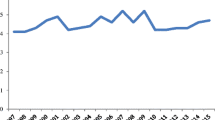Abstract
The paper aims to investigate the factors that influence or spurs criminal activities in Greece given its economic circumstances for the time period 1991–2010. Data were collected by international databases and published reports of the Greek Ministry of Order and were employed under statistical analysis. First, six independent variables (economic and demographic) were included in the research and it was investigated which affect the aggregate criminality. Results denote that the unemployment rate considerably affects the overall criminality. Moreover, criminality is sufficiently affected by the level of the average monthly wage and the level of population. The second point was the appointment of the factors that affect specific type-crimes. The assumption that recession would be reflected to a rise of criminality was not confirmed. Thieveries/burglaries and robberies (including robberies in banks) were not associated to any factor under study. Homicides, frauds, rapes, forgery, beggary, sexual assault, property rights crimes and illegal antiquities dealing, were not found to be associated to any economic factor. Only the crime of blackmails was found strongly associated with the level of the average monthly wages (p = 0.005). Finally, animals’ theft was associated to the amount of the general population and smuggling was found to be negatively related to the existing offenders.


Similar content being viewed by others
References
Antonopoulos, A. G. (2006). Public reporting of criminal activities to the police in Greece: Is there a difference when the offender is migrant? European Journal of Crime Criminal Law and Criminal Justice, 14(2), 135–160.
Antonopoulos, A. G. (2009). ‘Are the ‘others’ coming?’: Evidence on ‘alien conspiracy’ from three illegal markets in Greece. Crime, Law and Social Change, 52(5), 475–493.
Bryden, D. P., & Grier, M. M. (2011). The search for rapists’ “real” motives. Journal of Criminal Law and Criminology, 101(1), 171–278.
Crutchfield, R. D., Fernandes, A., & Martinez, J. (2011). Racial and ethnic disparity and criminal justice: How much is too much? Journal of Criminal Law and Criminology, 100(3), 903–932.
Denno, D. W. (1994). Gender, crime, and the criminal law defenses. Journal of Criminal Law and Criminology, 85(1), 80–180.
Entorf, H., & Spengler, H. (2000). Development and validation of scientific indicators of the relationship between criminality, social cohesion and economic performance. ZEW Dokumentationen No. 00-05, http://hdl.handle.net/10419/39090.
Hashimoto, E. J. (2011). Class matters. Journal of Criminal Law and Criminology, 101(1), 31–76.
Kaufmann, D., Kraay, A., & Mastruzzi, M. (2010). The worldwide governance indicators: Methodology and analytical issues. The World Bank Policy Research Working Paper No 5430, Sept 2010.
Lear, E. T. (1995). Contemplating the successive prosecution phenomenon in the federal system. Journal of Criminal Law and Criminology, 85(3), 625–675.
Leerkes, A., Engbersen, G., & van der Leun, J. (2012). Crime among irregular immigrants and the influence of internal border control. Crime, Law and Social Change, 58(1), 15–38.
Maas, D. (2011). Policing the ratings agencies: The case for stronger criminal disincentives in the credit rating market. Journal of Criminal Law and Criminology, 101(3), 1005–1038.
Morse, S. J. (2011). Mental disorder and criminal law. Journal of Criminal Law and Criminology, 101(3), 885–968.
Panther, M. S. (1995). The economics of crime and criminal law: An antithesis to sociological theories? European Journal of Law and Economics, 2(4), 365–378.
Reilly, B., & Witt, R. (1992). Crime and unemployment in Scotland: An econometric analysis using regional data. Scottish Journal of Political Economy, 39, 213–228.
Schawb, K. (2010). The global competitiveness report 2010–2011. World economic forum. Hampshire: Palgrave Macmillan.
Author information
Authors and Affiliations
Corresponding author
Rights and permissions
About this article
Cite this article
Laspa, C. Do the economic factors affect criminality? Evidence from Greece, 1991–2010. Eur J Law Econ 39, 107–118 (2015). https://doi.org/10.1007/s10657-013-9403-2
Published:
Issue Date:
DOI: https://doi.org/10.1007/s10657-013-9403-2




